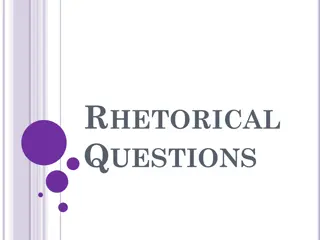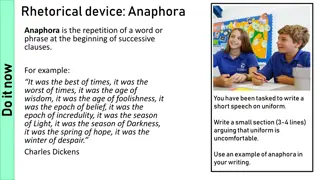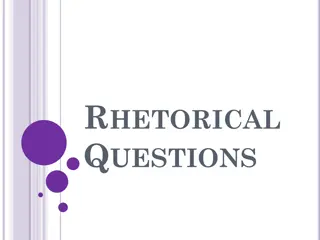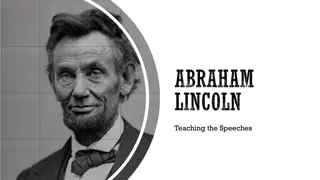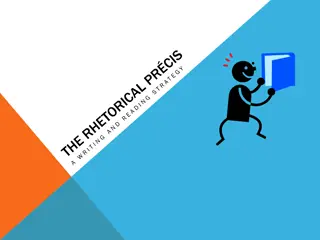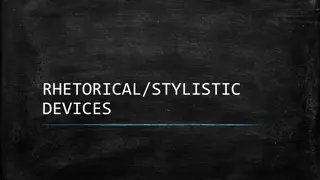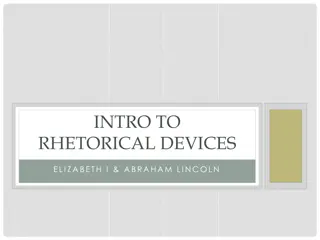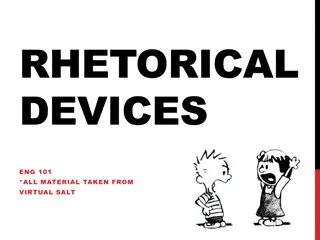Mastering Rhetorical Devices and Delivery Techniques for Effective Speeches
Explore the art of utilizing rhetorical devices such as aphorisms, allusions, analogies, and juxtaposition to enhance your speech delivery. Understand the significance of body language in communication and learn how to adapt it based on your audience, topic, and message. Discover the impact of varying your speaking volume and tone to convey emotions effectively throughout your speech.
Download Presentation

Please find below an Image/Link to download the presentation.
The content on the website is provided AS IS for your information and personal use only. It may not be sold, licensed, or shared on other websites without obtaining consent from the author.If you encounter any issues during the download, it is possible that the publisher has removed the file from their server.
You are allowed to download the files provided on this website for personal or commercial use, subject to the condition that they are used lawfully. All files are the property of their respective owners.
The content on the website is provided AS IS for your information and personal use only. It may not be sold, licensed, or shared on other websites without obtaining consent from the author.
E N D
Presentation Transcript
Rhetoric Devices and Delivery
Body Language- Nonverbal Communication Posture Movement Gestures Facial Expression Eye Contact What body language will be appropriate for your speech? Consider your audience, topic, and rhetorical appeals. How will your body language change throughout your speech? How will you remember where in your speech to include specific nonverbal communication?
Rhetorical Devices Aphorism- a pithy observation that contains a general truth. Examples: The worse the man the better the soldier. Napoleon A clear conscience is usually the sign of a bad memory. Stephen Wright Character is simply habit long continued. Plutarch What is the point of using aphorisms? How could you use aphorisms in your speech?
Rhetorical Devices Allusion- an expression designed to call something to mind without mentioning it explicitly; an indirect or passing reference. Examples: He was a Good Samaritan yesterday when he helped the lady start her car. He was a real Romeo with the ladies. Chocolate was her Achilles heel. What is the purpose of using allusions? How can you use allusions in your speech?
Delivery Change your speaking volume! What does getting louder than your normal speaking voice convey? What does getting softer than your normal speaking voice convey? Remember: make sure your normal speaking voice is audible to all in the room so that no one has to strain to understand you. Be sure that your volume and tone of voice match your message. What emotion is conveyed by your tone of voice?
Rhetorical Devices Analogy- a comparison between two things, typically on the basis of their structure and for the purpose of explanation or clarification. Examples: How a doctor diagnoses diseases is like how a detective investigates crimes. Just as a caterpillar comes out of its cocoon, so we must come out of our comfort zone. You are as annoying as nails on a chalkboard. What is the purpose of using analogies? What might be a natural analogy for the argument you are making?
Rhetorical Devices Juxtaposition- a technique in which two or more ideas, are placed side by side for the purpose of developing comparisons and contrasts. Examples: Is it right to have $200 Nikes when there are thousands of children without a single pair of shoes? How can we prevent immigration in the US when none of us would be Americans at all except that our ancestors came here out of some great need of their own. Guns are tools of death. They can take a life away, but never can they give it back. Guns are forces of destruction, not construction. What is the purpose of juxtaposition in a speech? What contrasting ideas might you be able to juxtapose in your speech to more powerfully express your argument?
Delivery Fluency- the ability to express oneself easily and articulately. Be sure that your presentation is smooth and flows well. Be sure you know how to pronounce all of the words in your speech (don t laugh, this happens often). Practice your speech so that you know exactly where your speech is going. Even if you don t memorize, you ll want to know where you re going.
Delivery Pauses and Pacing How fast should your speech go? Have you given your audience enough time to soak up your message? When to pause? Hint- periods, commas, and paragraph breaks all imply a need to pause. Also, remember the dramatic pause! Silence can be used to highlight your point.
Devices Anaphora- repetition and also repetition! This doesn t just mean restating your point. Use a phrase repeatedly for effect. Examples: I have a dream! MLK Jr Let freedom ring!- MLK Jr It was the best of times, it was the worst of times, it was the age of wisdom, it was the age of foolishness, it was the epoch of belief, it was the epoch of incredulity, it was the season of Light, it was the season of Darkness, it was the spring of hope, it was the winter of despair. Charles Dickens Where might you use repetition in your speech to drive your point home?
Devices Alliteration- the occurrence of the same letter or sound at the beginning of adjacent or closely connected words. Examples: We, the people, declare today that the most evident of truths that all of us are created equal is the star that guides us still; just as it guided our forebears through Seneca Falls, and Selma, and Stonewall Obama Peter Piper picked a peck of pickled peppers. Maybe she s born with it. Maybe it s Maybelline. Alliteration makes your speech more memorable. As you are writing, think of clever ways to phrase your ideas that can utilize alliteration at opportune moments.
Devices Rhetorical Questions- a question asked just for effect or to lay emphasis on some point discussed when no real answer is expected. Examples: If you prick us, do we not bleed? Shakespeare Are you stupid? Got milk? Rhetorical questions are used for effect. They drive your point home. Where in your speech might you want to drive your point home by using a rhetorical question or questions?





